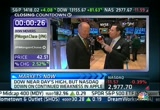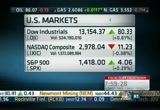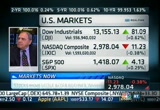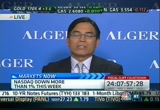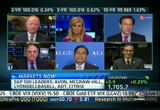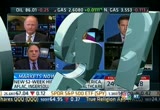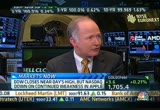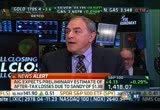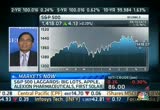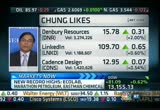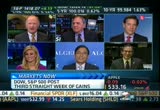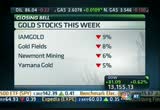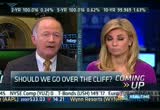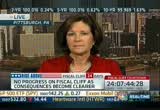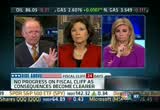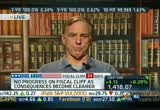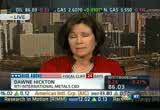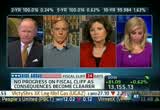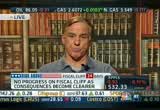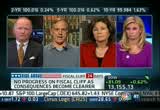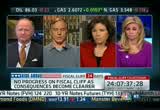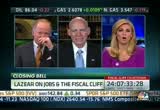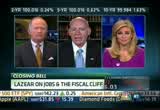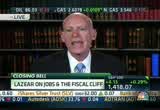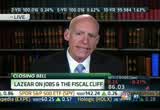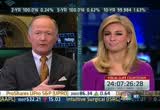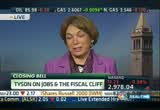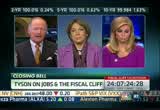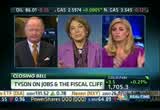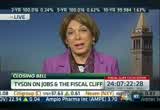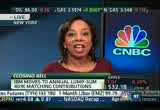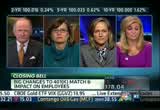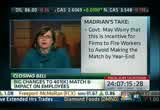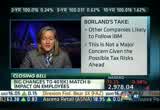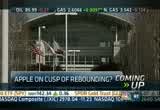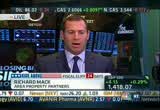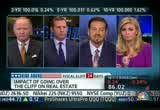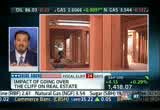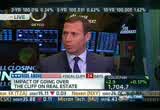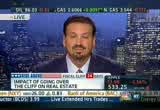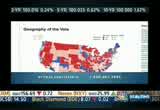tv Closing Bell With Maria Bartiromo CNBC December 7, 2012 4:00pm-5:00pm EST
4:00 pm
e phone. >> you still have a -- >> bill -- >> you still taking a bite out of apple. all right. very good. 20 seconds left. thank you, david. we are going out on the highs of the session here. fiscal cliff or no, the dow up 82 points. maybe liking the job number after all. much more to come. an old friend from the technical world joining us moments in the second hour of "the closing bell." and it is 4:00 p.m. on wall street. i'm mandy drury sitting in for maria bartiromo. this is where we're finishing the day on wall street. we're also finishing out the trading week as well. the nasdaq has been the underperformer all day because of apple. still sitting below 3,000. the dow managing to finish 80 points higher. the s&p 500 also stretching its legs, up by four points.
4:01 pm
bill, you're back. >> of course. we've just started without you here, mandy. i'm bill griffeth. let's find out who made money on wall street. i'm still getting dressed here. ralph is our mentor here. and there's our own rick santelli. so we just got started here. what do you think of this market? >> i'm ecstatic. >> you're ecstatic? >> yes. >> is that beyond bullish? >> yonbeyond bullish. if bad news can't take you down, that's good news. for the past couple weeks, that's all we've been getting. and the market is working its way higher. it's not only in the states. it's around the world whether it be hong kong, the dax or the
4:02 pm
cac. everybody is saying they'll compromise. one way or another, washington will compromise. >> you talking fundamentals here. >> we have to find out what the reason is it's going up. it has to be that. >> dan, are you ecstatic or more sober on what's happening? >> i'm a little more cautious. i totally agree with ralph that the market action today is terrific this year on bad news. i think the next six months are going to be very tricky. i think the fiscal cliff uncertainty is going to continue t actually. so i'm a little more bearish in the near term. then i think it's a sell-off, if there is one, that should be bought aggressively for a rally in the end of 2013 that would be the beginning of a new bull market. >> when you say a rally towards the end of next year, do you think over the course of 2013 it's going to end higher? we're going to be higher than where we are right now? >> yeah, i mean, i think ultimately 2013 ends up higher at the end. i think we're going to go -- we're going to test some lower resistance in the first six,
4:03 pm
seven months of the year. we have so much uncertainty in washington. we do have slowing economies in europe and in the u.s. >> right. david, what do you say right now? break the tie for us. >> break the tie. in the near term, there's an epic tug of war between extremely aggressive monetary easing and just total disdain for what they're doing in washington on tax and regulatory policy. in the near term, the fiscal cliff prevails. in the longer term, the fed will prevail. there's so much mistrust on stocks that i think that still can be a positive catalyst for stocks relative to traditional bonds over the next 12 months. >> i'm going to push back a little bit on that. >> i'm going to break the tie in ralph's favor. >> david, i want to push back a little bit on that. in terms of -- like, is the fed really that much of a factor these days now in terms of keeping the market afloat? >> absolutely.
4:04 pm
>> it's not losing its bang for its buck? >> it's not as powerful as it was in the fall of 2008 or even 2010, but when you consider that, u.s., long bonds, 1.5%. short-term interest rates, zero. negative on an inflation adjusted basis. the cost of capital is so low. i firmly believe in my lifetime this is the most aggressive fed easing we'll see in the last 5i years. that's what's so powerful. >> i think he just hit the ball into your court. >> i don't know how to say it anymore than that. >> i don't know how much more it could be aggressive. rick santelli, rates bounced today. we hit a low on the ten-year around 157. now it's at 162. it was higher than that earlier. what's going on in the treasury markets today? >> we're a whopping half a basis point higher than we were this time on friday of last week. >> when all is said and done, right? >> i agree with whoever said the
4:05 pm
fed is powerful. oh, they're powerful. they're the largest shareholder of treasuries in the world. they print money very fast. they buy it from the treasury. they're running out of mortgage securities to buy. oh, certainly they're powerful. if you're one of the lucky institutions that owns things like mortgage securities, you're pretty happy. if you're an average guy trying to get a mortgage, try to get that appraisal to go along with the financing. good luck to you on that. in terms of who did it best this week, citi up 10% on slashing 11,000 jobs. the morality of it, i feel sorry for people losing their jobs, but this is one of those stories where i guess a little bit of austerity was rewarded because at some point, everybody's got to pay the piper. >> you would think so. ralph, quantify your bullishness for us, if you can. a lot of houses on the street putting out their forecast for 2013 have been pretty bullish. they see this market as undervalued. they feel once we get the fiscal cliff out of the way that the
4:06 pm
market will be able to, you know, some of the cash comes back. what does that mean to you if you're bullish as well or ecstatic, as you said. >> in terms of the dow, i'm looking out about six months or so, into the first half of the year. i think that will be the bulk of the move. i think the dow could easily get to 15,000. >> in six months? >> yeah. >> okay. s&p? >> s&p is around, what, 1500. >> it's at 1416 today. >> yeah. >> 1418. >> a little over 1600. >> and is this the beginning of a new secular trend in the market? is this a cyclical bounce? >> no, no, no. you have to stand back and take a long look at what's happened. not day to day. march 2009 low was a generational bottom. we are in a secular bull market. so we're just extending it. we'll have periods of corrections, which we had. we'll even have bear markets.
4:07 pm
i don't think we'll ever get back to the lows of 2009. therefore, it's up, up, and away. the lifeline of this market is rotation. look at we're losing the technology and getting financials. perfect. >> all right. dan -- >> look, i agree. >> you're going to sell him what he wants to buy? >> i agree with the bullishness longer term. i think in the next, you know, zero to nine months, it's more like a fiscal cliff and we're b bungee jumping. the markets have done well. the fundamentals in corporate america have been way better than the economy. earnings growth and revenue growth in the s&p 500 has dramatically slowed since the second quarter. i think unfortunately one thing people are missing is that the uncertainty today is going to show up in the fundamentals in the first quarter, maybe even the first half of 2013. we still have a lot of issues in europe. andrea merkel has to get elected
4:08 pm
in the second half of next year. that's going to make it difficult for any pro-growth solutions to appear in europe. i think, frankly, i'm not that confident that the market hasn't already positively priced in a fiscal cliff resolution. i think the first half is like a bungee jump. >> so dan, cut through all of that, right. if we could put aside trying to forecast where the s&p is going to be, where the dow is going to be, regardless of where the markets in general are going to be, i believe you have stock picks for us. name what they are and will they be able to perform regardless of the macro environment? >> all right. we are focused on. companies that can grow regardless of what happens in the economy. three stocks we like, one is denbury resources. what's interesting about them is they have hedged their forward sales of oil so the lowest they're going to receive is $80
4:09 pm
next year. at those rates, they're going to be a very profitable company. it's a very inexpensive stock. we like that. it's a u.s. oil producer as well. we like that. link linkedin, we think attracted as much attention as it should. they're executing very well in the professional business social networking sense. in particular, head hunters across the globe. this is now the method of head hunting. finally, an enterprise software design company used in making semiconductor chips. we see them as providing a very stable and growing play on technology without necessarily having to pick, you know, end winners. >> got it. >> thank you. >> very good, guys. thank you all for joining us today. rick, good luck with the reappraisal on your property there, whatever you're going through. dan, ralph, thrilled to see you.
4:10 pm
>> thank you. >> so the dow hits its first three-week winning streak since august. apple upsetting weekly gains for the nasdaq. >> bob is going to join us with a look at the week's winners and losers. what do we have? >> the important thing is we had a rally going into the close. let's look at the breakdowns. even though we didn't move much on the indices, some of the major sectors did. i'm talking financials. citigroup's announcement about layoffs, not good for them or the employees, but good for the stock. hart ford also up on the week. i know everybody is obsessed with apple. yes, apple is down 9%, but look at dell, hewlett-packard. they turned around. dell bottomed out two weeks ago. now ten and change. same thing with hewlett-packard. let's talk about breakdowns. how about gold stocks? what an ugly year, what an ugly
4:11 pm
week. still moving down here. gold stocks are not only underperforming the stock market, they're underperforming gold as well. you want to get out of these now. stock of the week, my opinion, i'm going with freeport-mcmoran. there you see the stock for the week. finally, here we are. the major averages, pretty much unchanged. notice that the outperforming the s&p 500. that's because some of the higher priced stocked did better. apple weighed down the s&p and nasdaq. guys, have a good weekend. >> no one wraps it up like you do, bob. have a great weekend as well. see you mondays. house speaker john boehner says fiscal cliff talks remain stuck in neutral. >> the president insist on his position. insist on my way or the highway. >> well, going over that highway and the fiscal cliff would kill thousands of jobs, especially in the defense sector and the head
4:12 pm
of a defense contractor who will feel that pain joins us next along with former vermont governor howard dean who argues maybe going over the fiscal cliff will be the best thing for the nation. later, we have the former chairman of the council of economic advisers under president bush. he's going to join us as well as laura tyson, the former head of the cea under president clinton. we're going to get their take on the cliff and today's jobs number. also, tough week for apple shares. is now the time to load up? stick around for the apple trade in the back half of this hour. stay tuned. [ male announcer ] when this hotel added aflac
4:13 pm
4:15 pm
4:16 pm
and howard dean should be joining us any minute now. in the meantime, thank you so much for joining us today, dawn. tell us exactly how going over the fiscal cliff would impact the defense industry. >> well, the fiscal cliff would just be something that would be disastrous for defense. what you have are all these cuts of sequestration that are not tied to any national security plan or program. these would just be across the board with no plan involved. you have not only the major defense contractors but the entire supply chain involved. >> personalize it for us, dawn. what would it do specifically to your company? >> well, for us, we're a supplier not only to defense but also in the commercial markets, energy, and medical. it has already caused this uncertainty, roadw uncertainty, a reduction in the amount of work we're doing, and it's prevented us from hiring in some of our plants. >> you're holding back, then. you're holding back on hiring,
4:17 pm
waiting to see how this thing plays itself out. presuming they don't go over the cliff, they come to some agreement, does that mean you would hire more workers? >> right now it's very frustrating that we don't have issues decided here. so, yes, we have plants that can be ramping up to supply in the defense industry. until we know with certainty what's going to happen with the cuts, we're not going to be hiring in those plants. >> we're going to bring in now howard dean, who i believe is joining us. thank you for joining us. i hope that you've also been listening to what dawn had to say. she's been basically saying it would hurt her company. it's already affecting her hiring decisions. it would hurt the defense industry as well. so why do you feel that going over the fiscal cliff would be good? >> we have an enormous deficit problem in the united states. nobody's dealt with it since bill clinton was president of the united states. there are a number of things we're going to have to do in order to meet our deficit. we're going to have to both raise taxes and cut spending.
4:18 pm
one of the areas we must cut spending is defense. there hasn't been serious cuts in defense in 30 years. the defense industry is well positioned. they have plants in something in over 300 districts. there's a lot of bipartisan defense spending. for example, the defense authorization bill that just passed yesterday in the senate gave the pentagon $17 billion more than they asked for. so to think that any industry or any taxpayer or any group of people who depend on government spending can be exempted from the serious problem that we have that's caused by this deficit is a mistake. everybody is going to have to pay for this. >> dawn, right or wrong, the defense industry has this reputation of being bloated, overcharging. are we at a point where we could afford to make cuts in defense spending to try and satisfy the needs of lowering the deficit in this country? >> you know, the real issue we've already seen through the budget control act, the defense has already witnessed
4:19 pm
significant cuts. i think when you're looking at the resolution here, resolving the negotiations so we don't go to the fiscal cliff, the real issue is everybody's got to participate. it's got to be a balanced approach. last monday -- well, earlier this week, 130 ceos in the aerospace defense industry sent a letter to the president saying we're urging a bipart son approach to this. it's got to be balanced. nobody is saying that defense isn't going to share in that. right now, sequestration, $600 billion, that's not a fair share. >> can i phrase this a different way? will we still be safe? will we still have good national security if there are defense cuts? >> i think secretary panetta has already addressed his concerns that if, you know, we have this sequestration where you have $600 billion in cuts that take place on january 1st and go into effect, that's going to have a significant risk on our national
4:20 pm
security. >> hourward, go ahead. >> i have to object to this sort of thing. every cabinet officer is going to want their area exempted. the fact of the matter is that everybody has to participate. this is, in fact, a bipartisan agreement. this was a bipartisan agreement in order to put the debt ceiling back on track a year and a half ago. what you see is predictable. at the last minute when the agreement is about to take place, now individual special interests come in and want their money, including many of the republicans and democrats who voted for this in the first place. i'm very sympathetic with the defense industry. i'm sympathetic with seniors on medicare. i'm certainly sympathetic with the 100,000 kids who are going to lose their head start. we have got to do something about the deficit in this country. you cannot take the position that, well, pi industry needs to be exempted from this. or the defense will suffer. everything will suffer. we will make do. we're a great country, but the biggest danger to this country
4:21 pm
is not cuts to the defense department. the biggest danger going forward is a deficit that's going to approach 80% or 90% of gdp. >> if i could respond, nobody is saying that there's any one special interest that can't participate. what we're saying is it would be not the right approach to just take this one slash, giant additional defense cut. this has to be across the board. it's got to be a balanced budget. it's got to be addressing all sorts of issues. there's got to be spending cuts across the board as well as the raising of revenue. the real concern is not reaching a decision and just letting this take place without any direction and without any attachment, if you will, to a national security plan. >> howard, the feeling is if we go over the cliff, we go back to recession. isn't that a fear? >> it's not a fear. it's going to be reality. we're going to go into a mild recession for two quarters,
4:22 pm
about 1.5% negative growth. then we're going to come out by the end of the year. we'll be back above 2% growth. >> you're willing to risk a two-month recession to try and reduce deficit -- >> a two quarter recession. people have been talking for years about how serious the deficit is. this is a bipartisan solution. now people are getting cold feet when it's about to go into effect. i don't think this is the time for americans to blink. if you take the deficit seriously, then let's get this thing done. this is a bipartisan proposal to do it. it is tough. it is unpleasant. nobody says that when you borrow more money than you have and you spend it all that it's going to be easy to put yourself back on your feet. that is what has to happen. every industry, including defense. let me just say, this is a 2% across the board split evenly between defense and other spending, human service and so forth. this is not a punishment for defense. defense is taking a big hit. so are a lot of other programs. that's the way it should be. >> defense has really already
4:23 pm
taken the hit with the budget control act. what this sequestration does is places 50% of the cuts on 20% of the budget. fiscal cliff is not the answer. a bipartisan approach in washington to get it done. >> we need a deal. we need to rise above. we have fiscal cliff for what may happen at the end of the year. we need a term for what happens if we get back up. phil fiscal grinds, fiscal ladder. i don't know. >> thank you both for joining us. so much for november's better than expected jobs numbers. the former head of president bush's council of economic advisers says the data may not be all it is cracked up to be. he's next. and then later, laura tyson, former head of president clinton's council of economic advisers will weigh in on that and where things snand d.c. as we get closer to those automatic tax hikes and spending cuts. plus, 401(k) is not okay. some news that might worry everyone who's banking on a 401(k) for their retirement. keep it here to find out more.
4:25 pm
... what should we invest in? maybe new buildings? what about updated equipment? they can help, but recent research shows... ... nothing transforms schools like investing in advanced teacher education. let's build a strong foundation. let's invest in our teachers so they can inspire our students. let's solve this.
4:26 pm
or that printing in color had to cost a fortune. nobody said an all-in-one had to be bulky. or that you had to print from your desk. at least, nobody said it to us. introducing the business smart inkjet all-in-one series from brother. easy to use. it's the ultimate combination of speed, small size, and low-cost printing. better than expected numbers on the labor front for november out this morning. u.s. businesses added 146,000 jobs last month and the unemployment rate slipped to 7.7%, the lowest level in four years. of course, that's not the whole story because you had more people dropping out of the labor force. >> well, the former chairman of the council of economic advisers, now a senior fellow at the hoover institution. he joins us with his reaction.
4:27 pm
would you give it a, what, out of ten? >> i gave you part of the answer too, by the way. you're welcome. >> out of ten, what score would you give this report, ed? >> i would give this a three. this report is a perfect microcosm of the recovery. the job creation number was about 146,000, you know, over the past three years we've been averaging about 150,000 a month. the problem with that is that we need 117,000 a month just to keep pace with the growing population. so that means that we're really netting only a little over 30,000 a month toward getting back those 8 million jobs we lost in the recession. the problem is that at this rate of recovery, it'll take us a couple of decades to actually get back to where we need to be. >> a couple of decades? >> i'm sorry? >> a couple of decades? >> well, think about it. 30,000 a month, how do you get
4:28 pm
to 8 million at 30,000 a month? that's a couple decades. >> i know we could get into all the political wrangling and policies and fingers and that regard, but let's face it. as an economist, you have to acknowledge we're coming out of the worst economic debacle we've seen in this country in 75 years, and we're deleveraging our economy. companies are running scared and not hiring. so can you blame us for having the kind of economy that's stuck in second gear here? >> no, that's exactly the point. we are stuck in second gear. but your premise is that the deep recession means we have a slow recovery. in fact, that's backwards. we know historically that the deeper the recession, the faster the rebound. the biggest recession we had was called the great depression. actually, there were two economic downturns. the first one, 29 to 33. the second one, 37 and 38. in each of the years out of that, we grew it more than 10%. the problem is we're not growing at a recovery rate. we're growing at 2.2%.
4:29 pm
the average rate, even at a stable economy, is 3%. we're not recovering. we're not even keeping pace with what should be normal growth. that's the problem. i'm not trying to assess blame. i'm giving you the numbers, the reality. >> those are the facts. what's the solution? what do we do? if you were advising president obama, what would you do right now? what would you advise? >> well, he didn't call me, but if he had -- >> really? >> surprise. >> i would tell -- to be honest, i would tell him to take a few lessons from his defeated challenger. what i would do is i would focus primarily on four things. i would say, one, we need to get a better tax code, a much more pro-growth, pro-markets, pro-jobs tax code. we need to encourage economic trade with other countries. i mean really significant economic trade. one of the things i will give president obama credit for is he was able to get through the three free trade agreements that were negotiated by president
4:30 pm
bush at the end of his term and did not go through congress until president obama did that later on in his term. that's commendable. i'd like to see a lot more of that. the third would be a much more cautious dwrie regulation, the kind of regulation that actually works. more of a cost benefit analysis approach. the fourth is spending control. we jumped from 21% of gdp to 25% of gdp in spending in one year. that means we've been running a 9% deficit each year. we just can't sustain that. even if we increase taxes, if we tax the rich, what we're talking about is adding $900 billion to the debt every year instead of $1 trillion. it's not very long before you're italy under those circumstances pmplgts that's for sure. ed, good to see you. thank you for joining us today. appreciate it. >> thank you. >> we'll reach across the other side of the aisle. laura tyson, the former council of economic advisers under president clinton will be up next with her take on today's jobs report. later on, will the housing
4:31 pm
4:32 pm
wooohooo....hahaahahaha! oh...there you go. wooohooo....hahaahahaha! i'm gonna stand up to her! no you're not. i know. you know ronny folks who save hundreds of dollars switching to geico sure are happy. how happy are they jimmy? happier than a witch in a broom factory. get happy. get geico. fifteen minutes could save you fifteen percent or more. card hassles?
4:33 pm
4:34 pm
welcome back. moments ago we heard from ed, the former chair of the council of economic advisers under president bush saying he's not surprised by the latest jobs numbers, which beat expectations. >> let's get another perspective from an economist who served in the same role but under president clinton. she is laura tyson, now a member of president obama's council of jobs and competitiveness. >> welcome back. >> welcome back. thank you so much for joining us today. first of all, i believe you were listening in to the conversation we had with ed. what is your reaction to what he said about jobs and the economy? >> so, i do agree with him that this report is quite consistent with the trend of moderate/modest job creation. this has been a steady recovery. we've had 33 months now of private sector job growth. and it's coming in at approximately the same pace. i also agree completely that it's not enough because with the growth of the labor force and the amount of unemployed people we have right now, we do need much stronger job growth. so i agree with the overall
4:35 pm
characterization of the situation, but of course, obviously, i have some disagreement with his suggestions of what we should do about it. >> such as? >> yeah, how do we pick up the pace of job growth right now, realistically? >> so first of all, let me underscore my concern about the danger, the biggest danger to job growth over the next 12 months. it is the fiscal cliff. if we go over that, if all the tax cuts expire, if we have the sequester, if we don't extend payroll tax relief and unemployment benefits, we will end up at the end of 2013 with about over 3 million fewer jobs than we would have had otherwise. just imagine that. the fiscal cliff is going cost the economy in that order of magnitude, 3 million jobs. we should not, not, not go over that cliff. now -- >> by the same token, though, his point about -- and i don't want to make this about ed.
4:36 pm
the fact remains that the debt levels we have in this country in effect put a cap on growth right now. >> sure, sure, sure. i think that economists have been saying for years -- i have said repeatedly, economists on both sides of the aisle have said repeatedly what we need is a long-term plan for deficit reduction that begins to take effect when the economy is closer to its capacity. right now it's at least 6% below its capacity. the unemployment rate, 7.7, it should be like 5.7 at capacity. we should not be doing a lot of deficit reduction right now. we want to sends a credible message to markets that we're serious about deficit reduction, but to put it in place in that brutal way, $600 billion next year, forget it. that's not good economics. >> there is a school of thought that says that we just have to get used to lower job creation, right? that we cannot go back to the days of 300,000 or god forbid 400,000 because of structural programs.
4:37 pm
things like demographics. do you feel we just have to get used to less job creation? >> i heard two different things. on the structural unemployment issue, i just want to point out i actually tweeted today. ed has a good piece in the september wall street journal making a point that this is not a structural unemployment problem we have. this is a cyclical unemployment problem we have. it's because of our demand become bg weak. if you look at the cbo study, when it says why are we stuck so far below capacity, you know what they talk about? too little government spending at the federal, state, and local level. too little spending because of deleveraging and too little residential investment because we still have an unresolved housing situation, unresolved housing crisis for many americans facing foreclosure. those are all cyclical issues. i actually think we could, with the right set of policies, grow more quickly. do i think longer term we need tax reform?
4:38 pm
yes, we probably do, but by the way, right now we have the lowest taxes as a share of gdp in recent history, in modern history. we have profits as a share of gdp, profits as a share of national income at a historic high. this is not for want of having tax relief in the economy. it's for want of having spending in the economy. >> very good. good to hear from you again, laura. thank you for joining us. >> thank you very much. appreciate it. >> thank you. have a great weekend. as if you needed another reason to worry about your 401(k), changes could be coming that you need to know about and you cannot afford to miss it next. also, ugly week for apple stock, but is it on the verge of getting hot again? we'll have the apple trade coming up in a few minutes. time to toast today's close with this. if you're open, they will shop. according to a recent reuters survey, 30% said they shopped on thanksgiving day, slightly more than the 29% who said they
4:39 pm
shopped on black friday. so which retailer is gearing up for the last-minute holiday rush? find out next. with the spark cash card from capital one, olaf gets great rewards for his small business! pizza! [ garth ] olaf's small business earns 2% cash back on every purchase, every day! helium delivery. put it on my spark card! [ pop! ] [ garth ] why settle for less? great businesses deserve great rewards! awesome!!! [ male announcer ] the spark business card from capital one. choose unlimited rewards with 2% cash back or double miles on every purchase, every day! what's in your wallet? or double miles on every purchase, every day! music is a universal language. but when i was in an accident... i was worried the health care system
4:40 pm
spoke a language all its own with unitedhealthcare, i got help that fit my life. information on my phone. connection to doctors who get where i'm from. and tools to estimate what my care may cost. so i never missed a beat. we're more than 78,000 people looking out for more than 70 million americans. that's health in numbers. unitedhealthcare. we don't let frequent heartburn come between us and what we love. so if you're one of them people who gets heartburn and then treats day after day... block the acid with prilosec otc and don't get heartburn in the first place! [ male announcer ] one pill each morning. 24 hours. zero heartburn.
4:41 pm
4:42 pm
welcome back. you know that 401(k) plan you pay into every paycheck? company contribution changes at ibm could affect changes at other companies. >> that's absolutely right. our personal finance expert sharon epperson has more details. explain how that could work. >> it's a bell weather company with a highly rated 4011 k plan, but ibm is making big changes to its 401(k) plan starting next year. it's going to be giving its employee matching contribution only once a year at the end of the year rather than with each paycheck. ibm says it's doing this with its 401(k) plan because it is part of its continuing commitment to invest in its company's 401(k) plans while maintaining business competitiveness in a challenging economic environment. now, how exactly is this going to work? well, ibm is going to continue to contribute 6% to 10% of an employee's pay, depending on what that employee puts in.
4:43 pm
that employee will not qualify for the plan if they leave the company, unless they retire. so they will not get that matching contribution. companies offering an annual matching contribution, this is not new. there are about 14% of companies that currently do so, giving their matching contribution to the employee only once a year. this is according to the plan sponsor council of america. what's different, though, retirement plan experts tell me is that this is a way for corporations to better manage their costs. the unfortunate thing for many workers, according to financial advisers, is of course you're going to miss out on the dollar cost averaging of this added contribution, and that means you may miss out on longer-term returns. >> sharon epperson, thank you very much. what does this all mean to your retirement savings? allison says in today's economic climate this is a welcome trade-off. >> but bridget is more concerned and says employees become a lot more vulnerable to swings in the
4:44 pm
market. both of them join us now. thank you very much for joining us today. allison, let me get to you first. do you feel maybe this is something that employees are going to have to get used to? >> well, it's certainly something employees should be aware of. s it a change. it is ultimately a benefit reduction. in the grands scheme of things, however, with all the changes we've seen over the years, this is a smaller, incremental change and should be taken in context. >> bridget, what are your concerns? >> so my biggest concern with this change is its distributional implications. ibm is doing this presumably to reduce costs, and they could reduce match expenses in one of two ways. they could reduce the matching contribution a little bit for all employees, or what they've done is to reduce the contribution for employees who are leaving the company. i think from a policy standpoint, the problem with this approach is we know that when employees leave their
4:45 pm
company, that, in fact, is when their retirement savings contributions are most vulnerable. you leave a firm, you might be unemployed for a little while. you're not contributing. the employer is not contributing. in fact, we know that many employees actually tap into their existing balances and take money out of the plan, and now they're going to have even less going into the plan during their final year. it really hurts employees who have shorter job tenure. >> you know, allison, i get the point about trying to save money. you make the one-time contribution, and you wait until the end of the year. why penalize those employees who may leave midyear and not get credit for six months of contributions to their 401(k) plan and not get the company match? >> well, so think about it as focus, right. if a plan sponsor has to reduce cost and they're in a high-pressure environment, and many companies are in today's world, they have to focus those dollars on the employees that matter most, that are making the biggest difference, so they're rewarding the employees who are remaining with the economy
4:46 pm
through the end of the year. now that said, we also know to brijt's point, about 40% of employees cash out their balance wh when they leave anyway. when i think about the risks to financial security and what keeps me up at night about people's ability to retire, it's not about when they're going to get the match. it's about cashing out upon job determination. it's about matching contributions, being suspended altogether. it's about pressure on social security and what might happen with tax reform. so again, this is a reduction. let's be. clear about that. it's not in the grand scheme of things. it's not what keeps me up at night when it comes to financial security for the country. >> nonetheless, as you say, certainly something employees should be aware of and be educated on. thank you, both, for your side of the coin. >> i don't know. i'm going to have trouble sleeping tonight myself. >> i'm not. >> this worries me. >> it's friday night. i'm going to sleep like a log. >> i know you will. okay. has apple's stock lost its shine for good? my goodness me. is it on the cusp of a longer
4:47 pm
term rebounds? the apple trade coming up. also, the housing recovery we're seeing could get derailed by the fiscal cliff among other things. stick around because your monthly rent or mortgage could be affected by what we're going to talk about. if you think running a restaurant is hard, try running four. fortunately we've got ink. it gives us 5x the rewards on our internet, phone charges and cable, plus at office supply stores. rewards we put right back into our business. this is the only thing we've ever wanted to do and ink helps us do it. make your mark with ink from chase. every human being is unique. and there is one store that recognizes it. the sleep number store. the only place in the world you'll find the extraordinarily comfortable sleep number experience.
4:48 pm
an exclusive collection of innovations that totally individualize your sleep. perfectly comfortable pillows that adjust to your size and shape. temperature-balancing bedding. dual warmth comforters. all designed around the sleep number bed: a bed with dual-air technology that allows you to adjust to the support your body needs. each of your bodies. in the name of human individuality: the sleep number collection. discover how our sleep professionals can individualize your sleep experience. exclusively at one of our 400 sleep number stores nationwide. sleep number. comfort individualized. this holiday season, give the gift that's magical: the innovative airfit adjustable pillow at special 30% savings.
4:50 pm
well, there's a fear out there that the fiscal cliff could derail whatever recovery we're seeing in real estate right now. north american ceo o property partners. barry is chief market strategist at residential finance corporation. he is also a mortgage industry expert and i have almost used up the whole segment doing your titles. richard, let me get to you. what is the impact on real estate from the fiscal cliff? is this a real shocker? >> i don't think anything is a real shock. we are dealing with economic
4:51 pm
uncertainty low growth for a long time. there is no one answer as to how real estate is being impacted by the fiscal cliff. >> because it is all local. >> it is all local. i would say it also depends on what sector you are talking about. >> your experience is that there are people who are holding back on what they would otherwise buy or rent or invest in right now. >> i think that is absolutely correct. office demand which is business, how much business expanding, office demand year over year is down 16%. we are at an absorption low. >> do you think that would pick up if they figure out the fiscal cliff end of the year? >> i think the economy is going to pick up and people will buy homes and rent space. people will be less holding back generally. >> what about the mortgage deduction? this is either taken away from us or reduced the mortgage
4:52 pm
deduction to what extent will that hurt the housing market? >> it will have an impact. as they negotiate this fiscal cliff one of the things that is going to be on the table is the mortgage deduction. why? only 26% of filers actually claim the mortgage deduction so it may play well with lawmakers because they might figure it is not that big of a chunk. however, it can have a big impact. i think it is vital for first time home buyers. i hope they keep it in place. it is probably a better idea to take a look at it and say if we want to do something with it maybe sunset it after five years. >> you think a lot of people take that into account in terms of affordablity? >> yes they do. the mortgage deduction is an important way for people to reconcile what this would be compared to a rent. you can increase your dependents and get that difference every week within your paycheck.
4:53 pm
you don't have to wait until the end of the year to get a return. you can get it right away. >> what does it say about this market when we have record low mortgage rates. financing has never been cheaper for many parts of the economy? yet here you are talking about a hesitation on the part of certain constituencies in business to do business? >> it is an anomaly. the answer is two fold. one, they are scared that home prices will cannen to fall. they don't want to make a decision and they can't get credit. you can say the same about a lot of businesses. it is the uncertainty that we can't get by no matter how low we make rates. >> who is more afraid, the borrower or the lender? >> that is a very good question. i would like to talk to lenders about that but i think there is interesting opportunities to be
4:54 pm
a lender in the consumer space as well as commercial space. >> who has the greater fear as we have these record low mortgage rates and we are not seeing that much -- we are seeing a recovery but we are seeing more people rent right now? is it a function of the borrowers being scared more than the lenders or vice versa? >> you are seeing a good recovery. lenders wants to lend but under writing guidelines have changed. they are not the way they used to be. that is a good thing. they are appropriate now. they are similar to where they were 12 or 13 years ago. people need a job. you can't just fog up a mirror and get a mortgage today. as far as people's apprehension it is in the not too recent past where people know that there was a lot of horror stories. there is going to be fear out there. that is where the opportunity exists right now. when you compare to rent, rent is going to go up over time.
4:55 pm
>> enjoy your friday evening. thank you for joining us. apple stock falling about $50. >> we are going to get the straight on the other side of the break. [ male announcer ] the markets keep moving. make sure the news keeps coming with thinkorswim by td ameritrade. use the news links breaking stories with possible breakout stocks, options with potential opportunity, futures and forex with in-depth analysis. it's an all-you-can-eat buffet for all things trading. thinkorswim by td ameritrade. it doesn't just deliver news. it's making news. trade commission free for 60 days, plus get up to $600 when you open an account.
4:58 pm
apple has finished its worst week in two and a half years losing just over $50 thousand. >> we have a managing member of the volatility group and an options action contributor. what are traders saying here? do they expect that to recover? >> i think options traders a lot of activity today. you are talking about a tremendous volume in the stock. the biggest block trader was a call seller of above $600 a share. this trader was saying the upper range of apple over the next couple of months is 634.15. you are going to get a tremendous amount of volatility between the 505 level. the upside of the range if you are buying apple right now i
4:59 pm
think you will have trouble seeing the highs. the 634 level probably runs into resistance. >> what is the trade here in. >> certainly i am playing it long apple. i dipped in a little bit. like i said when you are seeing a company move around 2% and 5% swings this is not a fundamental picture that the stock market stock is moving around. this is a stock that is a traders market. i get guys tweeting me. you have to pick levels you want to get in here let's say around the 515 level. this is a trading stock right now until it readjusts and figures out what it is going to do with itself. if we break 515 be very cautious if apple breaks that level. >> watch out for the dreaded death cross. >> everybody has been talking about the death cross. i think you have to be a trader. pick levels you are willing to get in and out. >> thank you. good to see you. for
224 Views
IN COLLECTIONS
CNBC Television Archive
Television Archive  Television Archive News Search Service
Television Archive News Search Service 
Uploaded by TV Archive on

 Live Music Archive
Live Music Archive Librivox Free Audio
Librivox Free Audio Metropolitan Museum
Metropolitan Museum Cleveland Museum of Art
Cleveland Museum of Art Internet Arcade
Internet Arcade Console Living Room
Console Living Room Books to Borrow
Books to Borrow Open Library
Open Library TV News
TV News Understanding 9/11
Understanding 9/11